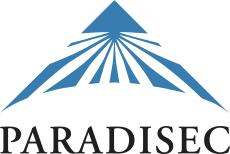Depositing material with PARADISEC
PARADISEC accepts deposits from linguists, ethnographers, ethnomusicologists and other researchers, and digitally stores these materials for safe keeping and long-term accessibility. Depositors can specify conditions on the access and use of their data, and only registered users can access primary records.
- Visit the Catalog and “Sign up” to apply for a username and password
- Return a signed Deposit Form (pdf) to PARADISEC, providing basic information and your access requirements on your materials, including any restrictions.
- Email us so we can create your first collection and to link your collection with your username.
- Fill in our basic metadata spreadsheet (.xlsx) to create items in your collection, and then enter further metadata directly into PARADISEC’s online catalog, to which you will have edit access.
- If your materials are already in digital format, contact us to arrange delivery of your files to PARADISEC to be imported into the repository.
- If your materials are NOT in digital format, PARADISEC can arrange for digitisation of some non-digital formats (typically audio tape, analog video, film, and images), or advise on other available means to get your files digitised.
- Please reduce the number of files to only those that are necessary, for example, not having multiple video or audio files of the same event, or multiple files that contain the same information.
- We may decide to combine many small files in an item into a single zip file, with textual description of the contents in the description field of the catalog.
More information available in our ‘Technical Guides’ pages
Our process
Tapes submitted to PARADISEC are assessed based on PARADISEC’s established criteria including: the condition of the tape; the regional origin of the material and the status of the language recorded. Any tapes which are assessed as being outside of the scope of the PARADISEC project are labelled and stored until they can be returned to the depositor with the rest of the deposited tapes. Tapes that comply with PARADISEC’s criteria are accessioned into the collection. Each tape accessioned is cataloged and assigned a persistent identifier and labelled with this identifier. The tapes are then assigned a priority for digitisation according to the PARADISEC criteria and are placed in a queue to be digitised.
Two digital files are created from the original tape: an archival standard 24bit/96khz file (filename.wav) and an MP3 file (filename.mp3). The archival standard version and the MP3 files are stored on a mass storage system.
The digital files which are created can be accessed through the web via the individual filenames, for example the file ‘YZ2-P8888-B.wav’ can be found via http://catalog.paradisec.org.au/collections/YZ2/items/P8888 .
Unless the files are on open access, only those people with permission (specified by the depositor) will be able to download the audio files. Access is password protected and users have to click an agreement detailing conditions of access.
PARADISEC has a commitment to freedom of expression and universal access to information. PARADISEC recognises that there may be occasions when online material contains information that is culturally sensitive, or breaches copyright or other relevant law, and enforces access restrictions whenever we are made aware of such issues.
If you find material in PARADISEC’s online collections that you believe infringes your rights, or, for example, contravenes privacy law, is defamatory, or is in breach of copyright, you may submit a takedown request by sending an email to admin@paradisec.org.au
Downloads available:
Archiving Workflow (pdf)
Uploading
We currently have no provision for depositors to upload their own files. Typically digital files have to be sent to us via a server, or on any suitable media, including USB sticks, hard disks or DVDs.
Fieldworkers need to make a Will
While we would like to think we will live forever, it is important that you include a section in your Will, that is your last Will and Testament, that expresses your wishes with respect to your field recordings and associated material.
As well as an executor for the rest of your estate, you should appoint a literary executor and ask them to deposit “my field recordings …………with institution X”. You need to tell them where the material is and what to do with it. You may also want to include a sum of money to cover the costs of transferring this material to your chosen repository.
The executor has a legal obligation to carry out the wishes of the will maker, so in everyone’s interests this needs to be as straightforward as possible, avoiding confusing or vague obligations put onto the executor which will frustrate the process of administration.
Each estate will be different so people should always get a solicitor to draw up the Will according to their circumstances.
Video guides to using our catalog
We have made two short videos that explain how to use Nabu, the PARADISEC catalog. The first video is aimed at users of the catalog, and the second is aimed at potential depositors.
